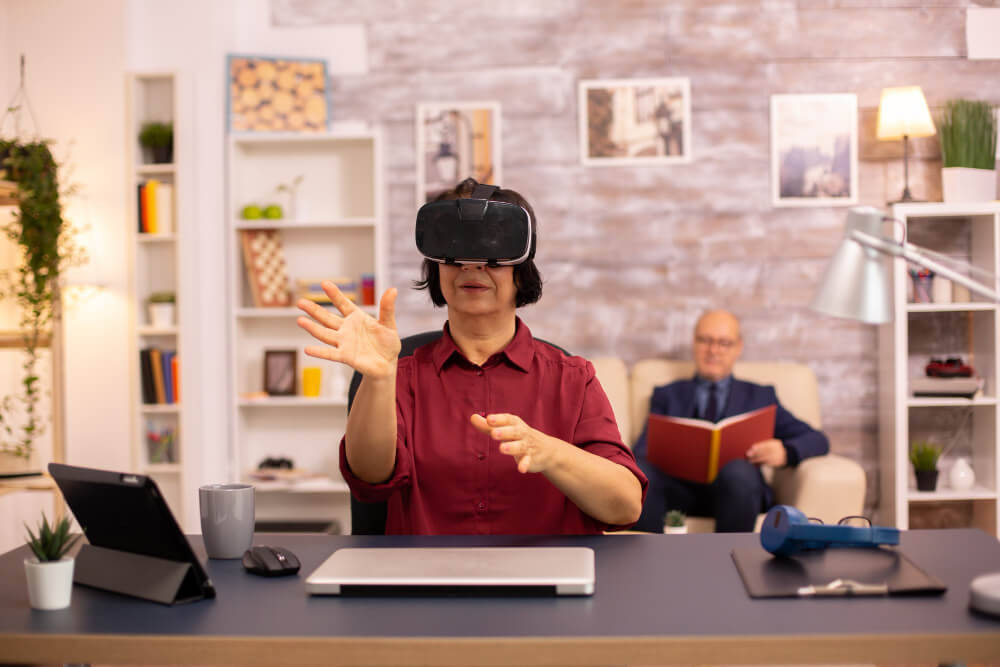Revolutionizing Communication
Communication is one of the most notable aspects of life transformed by technology. Smartphones, high-speed internet, and social media platforms have made it easier than ever to stay in touch with loved ones, regardless of location. Apps like WhatsApp, Skype, and Zoom have brought people closer, whether for personal or professional purposes. Additionally, the evolution of 5G technology promises to make communication even faster and more seamless.
From instant messaging to live video calls, these tools have removed barriers to interaction, allowing businesses to grow globally and personal relationships to thrive across distances. The speed and convenience of modern communication have fundamentally changed how we interact and collaborate.
Transforming Work and Productivity
Technology has redefined the concept of work. Remote working, once an exception, is now a norm thanks to tools like Slack, Microsoft Teams, and Google Workspace. Employees can collaborate from anywhere in the world, sharing documents and holding virtual meetings as if they were in the same room.
Moreover, automation through artificial intelligence (AI) and machine learning (ML) has eliminated repetitive tasks, enabling employees to focus on more strategic and creative aspects of their jobs. Cloud computing has also revolutionized data storage and access, allowing businesses to scale rapidly and operate efficiently.
Startups and small businesses, in particular, have benefited immensely from cost-effective tech solutions, enabling them to compete with larger enterprises. Whether it’s analytics tools, CRM software, or project management apps, technology is empowering companies to innovate and grow.
Advancing Healthcare Accessibility
The healthcare industry has seen some of the most groundbreaking technological advancements. Telemedicine has made it possible for patients to consult doctors without leaving their homes, improving access to healthcare for remote and underserved populations. Wearable devices like Fitbit and Apple Watch allow users to monitor their vitals, promoting preventative healthcare.
AI-driven diagnostics and robotic surgery are also making treatments faster, safer, and more accurate. For example, AI algorithms can now analyze medical scans with precision, detecting diseases in their early stages. Virtual reality (VR) is being used in therapy and pain management, offering innovative solutions to traditional healthcare challenges.
In the near future, personalized medicine powered by genetic engineering and AI could revolutionize treatments, offering tailored solutions based on an individual’s genetic profile.
Redefining Education

Technology has bridged the gap between traditional education and modern learning methods. Virtual classrooms, online courses, and e-learning platforms like Udemy, Coursera, and Byju’s have democratized access to knowledge. Students can now learn from the best instructors worldwide without stepping into a physical classroom.
Interactive tools like augmented reality (AR) and gamified learning apps make studying more engaging and effective. Students can visualize complex concepts, perform virtual experiments, and collaborate with peers globally. This blend of technology and education is creating a future-ready workforce equipped with the skills demanded by evolving industries.
For professionals, online certifications and workshops offer opportunities for upskilling, enabling them to stay relevant in an ever-changing job market. Technology has truly made lifelong learning a reality.
Enhancing Entertainment and Lifestyle
The entertainment industry has embraced technology wholeheartedly. Streaming platforms like Netflix, Disney+, and Spotify have replaced traditional television and radio, offering personalized content at your fingertips. Augmented reality games and virtual reality experiences are blurring the lines between fiction and reality, providing immersive entertainment like never before.
Technology has also infiltrated daily routines, making life more convenient. Smart home devices like Alexa and Google Nest allow users to control appliances, set reminders, and even manage their schedules effortlessly. Fitness apps and gadgets encourage healthy living by tracking physical activity, sleep patterns, and calorie intake.
From gaming consoles to wearable tech, technology has become an integral part of how we relax and rejuvenate.
Future Trends to Watch
As we look ahead, several technology trends are poised to shape our future:
- Artificial Intelligence and Machine Learning: AI will continue to revolutionize industries like healthcare, finance, and transportation, powering innovations like autonomous vehicles and predictive analytics.
- Blockchain Beyond Cryptocurrency: Blockchain technology will expand its reach, offering secure solutions in supply chain management, voting systems, and more.
- Sustainable Tech Solutions: From renewable energy to eco-friendly gadgets, sustainability-focused technology is set to dominate the coming years.
- Quantum Computing: With the potential to solve complex problems in seconds, quantum computing could be a game-changer in scientific research and development.
Conclusion
Technology has not only changed how we live but also shaped how we think and dream about the future. Its impact is felt in every industry, from education and healthcare to entertainment and beyond. As technology evolves, it brings with it the promise of a smarter, more connected, and more sustainable world.
By staying informed and embracing these innovations, we can harness the power of technology to improve our lives and create a brighter future for generations to come.




